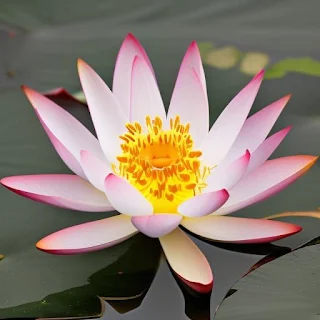The Egyptian Lotus: Where Biology Meets Myth | Science Meets Folklore
The Egyptian Lotus: Where Biology Meets Myth
The lotus flower, Nymphaea caerulea (the blue lotus) and Nymphaea lotus (the white lotus), is more than just a beautiful aquatic plant. For the ancient Egyptians, it was a living paradox, a profound symbol woven into the very fabric of their universe, bridging the gap between observable science and deeply held spiritual beliefs.
Explore more traditional knowledge in the African Science & Folklore Hub .

The Science: A Flower of Unique Adaptations
From a biological standpoint, the Egyptian lotus is a marvel of adaptation.
- The Daily Cycle: The lotus exhibits a unique nyctinastic movement—it sinks below the water at dusk and re-emerges to bloom anew each morning. This isn't just poetic; it's a survival mechanism, protecting its reproductive parts during the cooler night.
- Thermoregulation: Remarkably, the lotus can generate heat, a trait known as thermogenesis. This helps volatilize its scent molecules, attracting pollinators more effectively in the cool morning air.
- Psychoactive Properties: Modern science has identified apomorphine and nuciferine in the blue lotus, compounds with mild psychoactive and sedative effects. This provides a chemical basis for its use in religious trances and medicinal preparations.
The Folklore: A Symbol of Cosmic Order
The ancient Egyptians observed this daily cycle and imbued it with cosmic significance. The lotus became a cornerstone of their mythology.
- The Sun and Creation: The lotus's daily resurrection mirrored the sun's journey. It became the symbol of the sun god, Ra. The belief was that the sun itself was a giant lotus blossom that bloomed at dawn, bringing the world into existence each day. In one creation myth, a giant lotus emerged from the primordial waters of Nun, and from it rose the first god, Atum.
- Rebirth and the Afterlife: Because it returned each morning from the murky depths, the lotus became a powerful emblem of death and rebirth. It was frequently depicted in tomb art and placed on mummies, symbolizing the promise of resurrection and eternal life, rising pure from the waters of the underworld.

Where They Converge: The Garland of Daily Life
The intersection of science and folklore was most evident in the daily lives of the Egyptians. They didn't just revere the lotus in myth; they integrated its biological reality into their culture.
The Folklore Use: Flowers, especially lotus garlands and wreaths, were essential for everything from religious ceremonies to lavish banquets. Guests at a feast would be presented with a lotus to hold, with garlands around their necks and a single flower hanging over the forehead. These adornments were markers of status, celebration, and purity.
The Scientific Reasoning: This practice had a multi-sensory foundation. The lotus's vibrant color (visual beauty) and thermogenic scent (olfactory pleasure) created an atmosphere of luxury and sanctity. Furthermore, the potential mild psychoactive properties of the flower, inhaled or absorbed through the skin during lengthy ceremonies or feasts, could induce a state of relaxed euphoria, enhancing both spiritual connection and social enjoyment.
Beyond the lotus, wreaths incorporated a symphony of local flora—chrysanthemum, acacia, myrtle, and olive—each likely chosen for its scent, durability, and perhaps even its own subtle medicinal or symbolic properties.
See how other natural wonders blend observation and meaning in our Science + Folklore Hub , exploring Africa’s earliest understanding of botany, astronomy, and myth.
The Enduring Legacy
The lotus flower continues to captivate us today, not just for its timeless beauty but as a perfect example of how humanity uses nature to explain the universe. The ancient Egyptians saw a flower that followed the sun and emerged from the mud pure and beautiful. Through their lens of folklore, they crafted a symbol of creation, life, and eternal return. Today, science gives us the "how"—the biology of its cycle and the chemistry of its scent. Yet, the "why"—the profound emotional and spiritual resonance of the lotus—remains the enduring gift of Egyptian tradition, a reminder that observation and meaning have always been intertwined.


























